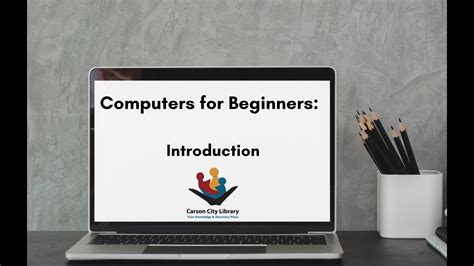In today's digital age, having a basic understanding of computer concepts is crucial for navigating the online world and staying connected with others. Whether you're a complete beginner or looking to refresh your knowledge, this article will cover the essential computer concepts that will get you started on your digital journey.

Computers have become an integral part of our daily lives, and understanding how they work can be a game-changer. From basic hardware components to software applications, we'll break down the essential computer concepts that will help you become more confident and proficient in using technology.
Hardware Components: The Building Blocks of Computers
When it comes to computers, hardware refers to the physical components that make up the system. These components work together to process information, store data, and provide output. Here are the essential hardware components you should know:
- Central Processing Unit (CPU): The CPU, also known as the processor, is the brain of the computer. It executes instructions and performs calculations.
- Memory (RAM): Random Access Memory (RAM) is temporary storage for data and applications. The more RAM, the more applications you can run simultaneously.
- Storage Drive: A storage drive, such as a hard drive or solid-state drive, stores your operating system, programs, and data.
- Input/Output Devices: Input devices, like keyboards and mice, allow you to interact with the computer. Output devices, such as monitors and speakers, display and play back information.

Software Applications: The Programs That Make Computers Useful
Software applications are programs that run on your computer, allowing you to perform specific tasks. Here are the essential software applications you should know:
- Operating System (OS): The OS, such as Windows or macOS, manages hardware resources and provides a platform for running applications.
- Productivity Software: Productivity software, like Microsoft Office or Google Docs, helps you create documents, spreadsheets, and presentations.
- Web Browsers: Web browsers, such as Google Chrome or Mozilla Firefox, allow you to access and navigate the internet.
- Antivirus Software: Antivirus software, like Norton or McAfee, protects your computer from malware and viruses.

Networking and Internet: Connecting to the World
Networking and internet concepts are essential for communicating with others and accessing online resources. Here are the key concepts you should know:
- Network: A network is a group of interconnected devices that share resources and communicate with each other.
- Internet: The internet is a global network of interconnected computers and servers that provide access to information and services.
- Wi-Fi: Wi-Fi is a wireless networking technology that allows devices to connect to the internet without cables.

Cybersecurity: Protecting Your Digital Assets
Cybersecurity is critical for protecting your digital assets from unauthorized access, theft, and damage. Here are the essential cybersecurity concepts you should know:
- Password Security: Use strong, unique passwords for all accounts, and avoid using the same password for multiple sites.
- Firewalls: Firewalls block unauthorized access to your computer and network.
- Antivirus Software: Antivirus software detects and removes malware and viruses.

Cloud Computing: Storing and Accessing Data Online
Cloud computing allows you to store and access data online, using remote servers and infrastructure. Here are the essential cloud computing concepts you should know:
- Cloud Storage: Cloud storage services, like Google Drive or Dropbox, allow you to store and access files online.
- Cloud Computing: Cloud computing platforms, like Amazon Web Services or Microsoft Azure, provide scalable computing resources and infrastructure.

Emerging Technologies: Shaping the Future of Computing
Emerging technologies, like artificial intelligence, blockchain, and the Internet of Things, are shaping the future of computing. Here are the essential emerging technologies you should know:
- Artificial Intelligence (AI): AI refers to the development of intelligent machines that can perform tasks that typically require human intelligence.
- Blockchain: Blockchain is a decentralized, digital ledger that records transactions and data.
- Internet of Things (IoT): IoT refers to the network of physical devices, vehicles, and home appliances that are embedded with sensors and software.

In conclusion, these 7 essential computer concepts will provide you with a solid foundation for understanding the basics of computing. From hardware components to emerging technologies, this knowledge will help you navigate the digital world with confidence and proficiency.






We hope this article has provided you with a comprehensive introduction to the essential computer concepts. If you have any questions or topics you'd like to discuss, feel free to comment below. Share this article with others who may benefit from this knowledge, and don't forget to follow us for more informative content.
What is the difference between hardware and software?
+Hardware refers to the physical components of a computer, such as the CPU, memory, and storage drive. Software, on the other hand, refers to the programs and operating systems that run on the computer.
What is the purpose of a firewall?
+A firewall is a security system that blocks unauthorized access to a computer or network. It helps protect against hackers, malware, and other online threats.
What is cloud computing?
+Cloud computing refers to the use of remote servers and infrastructure to store and process data. This allows users to access and share files online, and provides scalable computing resources.
